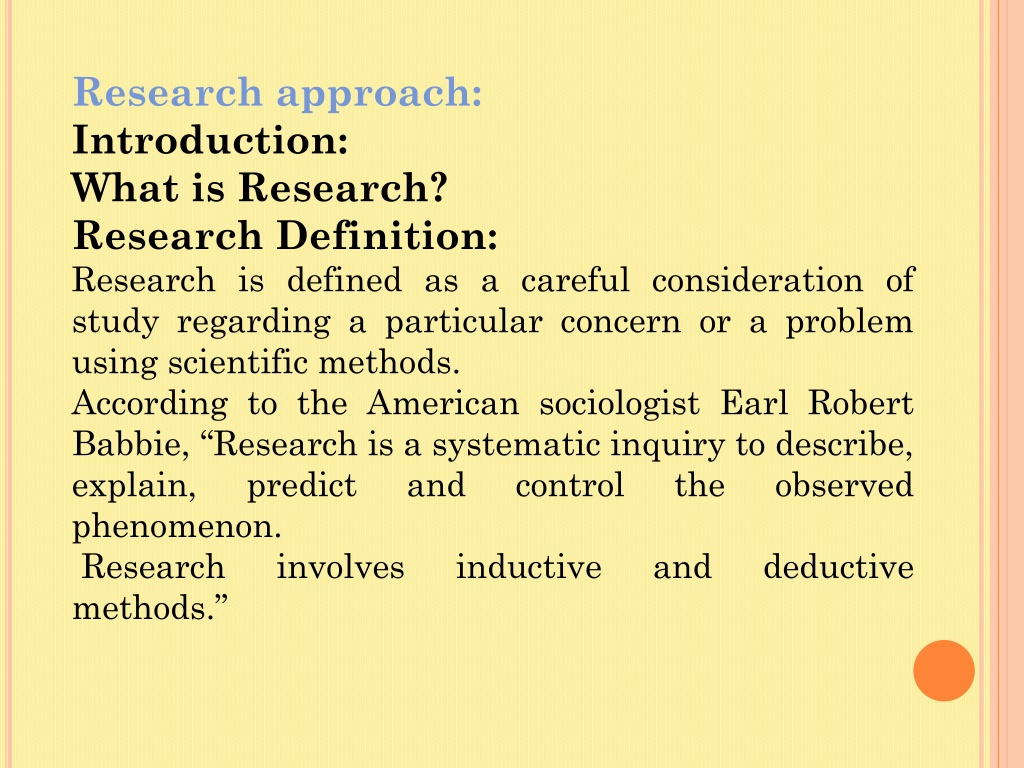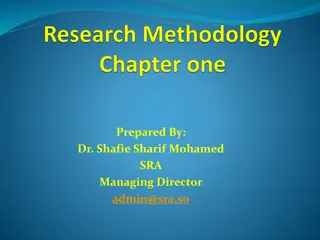Understanding the Fundamentals of Research: A Comprehensive Overview
Research is a systematic inquiry aimed at understanding, describing, explaining, and predicting phenomena using scientific methods. It involves both inductive and deductive approaches, with a focus on logical reasoning and real-time data collection. Key characteristics include a systematic approach, ethical considerations, in-depth analysis, and the generation of new questions. Researchers follow rules and procedures to ensure accuracy and reliability in their findings.
Download Presentation

Please find below an Image/Link to download the presentation.
The content on the website is provided AS IS for your information and personal use only. It may not be sold, licensed, or shared on other websites without obtaining consent from the author. Download presentation by click this link. If you encounter any issues during the download, it is possible that the publisher has removed the file from their server.
E N D
Presentation Transcript
Research approach: Introduction: What is Research? Research Definition: Research is defined as a careful consideration of study regarding a particular concern or a problem using scientific methods. According to the American sociologist Earl Robert Babbie, Research is a systematic inquiry to describe, explain, predict and phenomenon. Research involves inductive methods. control the observed and deductive
Inductive research methods are used to analyze the observed phenomenon and are associated with qualitative research . Deductive methods observed phenomenon, deductive methods are more commonly associated with quantitative research. are used to verify the One of the most important aspects of research is the statistics associated with it, conclusion or result. It is about the thought that goes behind the research. Research is conducted with a purpose to understand: What do study really want to find out? What are the processes that need to be followed to chase the idea? What are the arguments that need to be built around a concept?
Research approach Deductive process in research approach Research approach Inductive process in research approach
Characteristics of Research 1. A systematic approach is followed in research. Rules and procedures are an integral part of research that set the objective of a research process. Researchers need to practice ethics and code of conduct while making observations conclusions. or drawing 2. Research is based on logical reasoning and involves both inductive and deductive methods. 3. The data or knowledge that is derived is in real time, actual observations in the natural settings.
4. There is an in-depth analysis of all the data collected from research so that there are no anomalies associated with it. 5. Research creates a path for generating new questions. More research opportunity can be generated from existing research. 6. Research is analytical in nature. It makes use of all the available data so that there is no ambiguity in inference. 7. Accuracy is one of the important character of research, the information that is obtained while conducting the research should be accurate and true to its nature.
For example, research conducted in a controlled environment like a laboratory. Here accuracy is measured of instruments used, calibrations, and the final result of the experiment.
What are the types of Research? Following are the types of research methods: Basic Research: Basic research is mostly conducted to enhance knowledge. It covers fundamental aspects of research. The main motivation of this research is knowledge expansion. It is a non-commercial research and doesn t facilitate in creating or inventing anything. For example, an experiment is a good example of basic Research. Applied Research: Applied research focuses on analyzing and solving real-life problems. This type of research refers to the study that helps solve practical problems using scientific methods.
This research plays an important role in solving issues that impact the overall well-being of humans. For example, finding a specific cure for a disease Problem Oriented Research: As the name suggests, problem-oriented research is conducted to understand the exact nature of the problem to find out relevant solutions. The term problem refers to having issues or two thoughts while making any decisions. Problem Solving Research: This type of research is conducted by companies to understand and resolve their own problems. The problem-solving research uses applied research to find solutions to the existing problems.
Qualitative Research: is a process that is about inquiry, that helps in-depth understanding of the problems or issues in their natural settings. This is a non- statistical research method. Qualitative research is heavily dependent on the experience of the researchers and the questions used to probe the sample. The sample size is usually restricted to 6-10 people in a sample. Open-ended questions are asked in a manner that one question leads to another. The purpose of asking open-ended questions is to gather as much information as possible from the sample.
Following are the methods used for qualitative research: One-to-one interview. Focus groups. Ethnographic Research. Content/ Text Analysis. Case study research. Quantitative Research: this research method uses a computational, statistical and similar method to collect and analyze data. Quantitative data is all about numbers. Quantitative research involves a larger population as more number of people means more data. In this manner, more data can be analyzed to obtain accurate results
This type of research method uses close-ended questions because, in quantitative research, the researchers are typically looking at measuring the extent and gathering foolproof statistical data. Online surveys, questionnaires, and polls are preferable data collection tools used in quantitative research. There are various methods of deploying surveys or questionnaires. In recent times online surveys and questionnaires have gained popularity. Survey respondents can receive these surveys on mobile phones, emails or can simply use the internet to access surveys or questionnaires.























